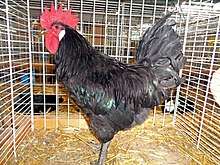Bresse Gauloise
The Bresse Gauloise is a French breed of domestic chicken. It originates in the historic region and former province of Bresse, in the regions of Rhône-Alpes, Bourgogne and Franche-Comté, in eastern France. Because of legal restrictions on the use of the name, only white chickens raised within that area may be called "Bresse"; outside it, they are given the name "Gauloise"; the breed name combines both.[6][7] Four colours are recognised for the Bresse Gauloise, three of them linked to areas within Bresse:[8] the Bresse de Bourg is "grey" (silver-pencilled); the Bresse de Bény is white; the Bresse de Louhans is black; a blue variety has recently been created.[2] White Bresse de Bény chickens and capons raised in the area of Bresse have appellation d'origine contrôlée status and are marketed as poulet de Bresse; they are regarded as a premium product and command higher prices than other chickens.[9]:378
 | |
| Conservation status | FAO (2007): no data[1]:44 |
|---|---|
| Other names |
|
| Nicknames | pattes-bleues |
| Country of origin | France |
| Distribution | |
| Standard | Bresse Gauloise Club |
| Use | dual-purpose: eggs and meat |
| Traits | |
| Weight | |
| Skin colour | white |
| Comb type | single comb |
| Classification | |
| APA | not listed[3] |
| EE | yes[4] |
| PCGB | rare soft feather: light[5] |
| Notes | |
| slate-blue legs | |
| |

History
The first documentation of the chickens of Bresse reportedly dates from 12 November 1591, when the citizens of Bourg presented two dozen birds to Joachim de Rye, Marquis de Treffort.[2] In the early nineteenth century, the lawyer, politician, epicure and gastronome Jean Anthelme Brillat-Savarin (1755–1826), who was born at Belley in the Ain, is supposed to have described the Bresse chicken as "the queen of poultry, the poultry of kings".[10] Like the La Flèche, which was raised and fattened in a similar fashion, the Bresse chicken had high standing in the market. Nevertheless, by about 1900 the breed had virtually disappeared.[2] Its recovery was due to fancy breeders, who selectively bred a sufficient number of white chickens for the breed to become stable.[6] A new breed standard was drawn up in 1904. The Bresse name, used for both chicken products and for the dinde de Bresse, the turkey of the area, received legal protection on 22 December 1936;[2] this became an appellation d'origine contrôlée (AOC) in 1957.[10]
Characteristics
Use
Although the Bresse Gauloise is principally famous as a meat breed, it is a good layer of large white eggs, which in the black Louhans variety may weigh 70 g.[2] Hens are usually non-sitting.[11]:23
References
| Wikimedia Commons has media related to Bresse Gauloise. |
- Barbara Rischkowsky, D. Pilling (editors) (2007). List of breeds documented in the Global Databank for Animal Genetic Resources, annex to The State of the World's Animal Genetic Resources for Food and Agriculture. Rome: Food and Agriculture Organization of the United Nations. ISBN 9789251057629. Accessed October 2014.
- Dirk de Jong (2007). De Bresse-Gauloise: Ruim 400 jaar oud en nog springlevend = Bresse-Gauloise: More than 400 years old, and still fresh and lively. Aviculture-Europe 3 (2): [unpaginated, 9 pages].
- APA Recognized Breeds and Varieties: As of January 1, 2012. American Poultry Association. Archived 4 November 2017.
- Liste des races et variétés homologuée dans les pays EE (28.04.2013). Entente Européenne d’Aviculture et de Cuniculture. Archived 16 June 2013.
- Breed Classification. Poultry Club of Great Britain. Archived 12 June 2018.
- E. Verrier, M. Tixier-Boichard, R. Bernigaud, M. Naves (2005). Conservation and value of local livestock breeds: usefulness of niche products and/or adaptation to specific environments. Animal Genetic Resources Information 36 (April 2005): 21-31. Rome: Food and Agriculture Organization of the United Nations. doi:10.1017/S1014233900005538.
- Breed data sheet: Bresse/France. Domestic Animal Diversity Information System of the Food and Agriculture Organization of the United Nations. Accessed October 2014.
- Bresse Gauloise: Standard (in French). Bresse Gauloise Club. Archived 14 January 2014.
- Alan Davidson (1999). The Oxford Companion to Food. Oxford: Oxford University Press. ISBN 9780192115799.
- Jon Henley (10 January 2008). Top of the pecking order. The Guardian. Accessed October 2014.
- Victoria Roberts (2008). British poultry standards: complete specifications and judging points of all standardized breeds and varieties of poultry as compiled by the specialist breed clubs and recognised by the Poultry Club of Great Britain. Oxford: Blackwell. ISBN 9781405156424.